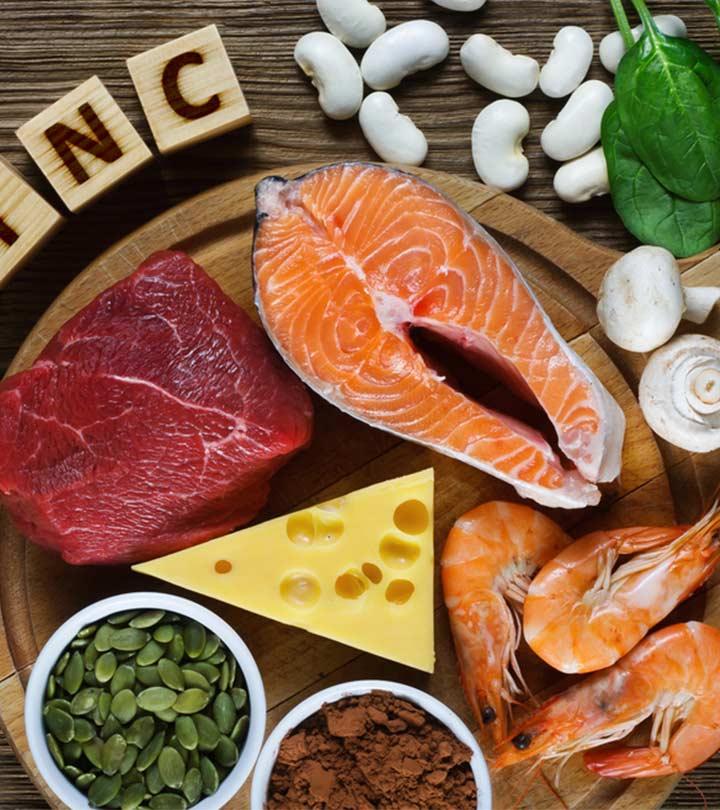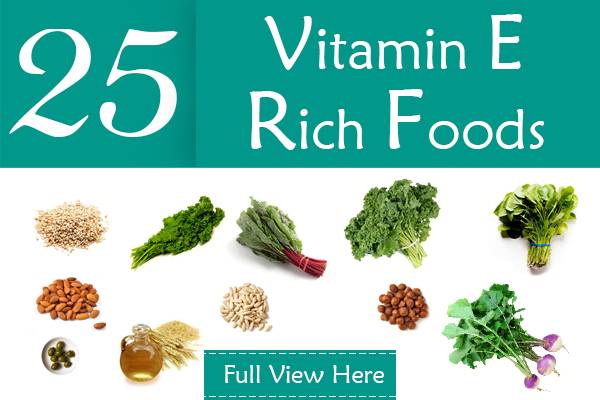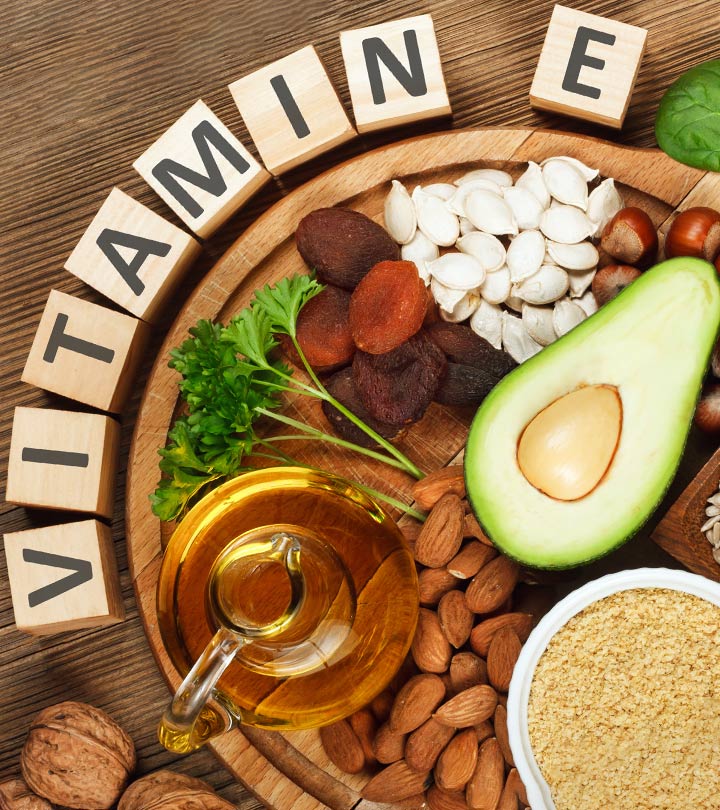Including vitamin E-rich foods in your diet is essential for overall health. These foods are the best natural sources of vitamin E: almonds, sunflower seeds, pine nuts, avocado, peanut butter, fish, and red bell peppers.
Vitamin E is crucial for maintaining healthy skin, promoting cell function, and protecting against oxidative damage. Adequate vitamin E intake can be achieved by incorporating these foods into daily meals. Whether you eat almonds, add sunflower seeds to your salad, or enjoy avocado on toast, these foods will provide the necessary dose of vitamin E to support your wellbeing-.
So, let’s explore the top 25 vitamin E-rich foods and discover how they can benefit our health.

Introduction To Vitamin E
Discover the 25 best vitamin E-rich foods to incorporate into your diet for optimal health benefits. From almonds and avocados to spinach and sunflower seeds, these natural sources of vitamin E are essential for overall wellbeing.
What Is Vitamin E?
Vitamin E is a powerful antioxidant that plays a crucial role in maintaining overall health. It is a group of fat-soluble compounds that include both tocopherols and tocotrienols. There are eight forms of vitamin E, with alpha-tocopherol being the most commonly found form in the human body. Vitamin E is vital for various bodily functions, including immune system function, cell protection, and DNA repair.
Importance Of Vitamin E In The Diet
Vitamin E is essential for maintaining a healthy body. It offers a range of health benefits, including:
- Antioxidant Protection: Vitamin E acts as a powerful antioxidant, neutralizing harmful free radicals that can cause cellular damage in the body.
- Heart Health: Vitamin E helps reduce oxidative stress and inflammation, which can contribute to the development of heart disease.
- Immune System Support: Vitamin E is crucial in supporting immune system function and helps protect against infections.
- Skin Health: Vitamin E promotes healthy skin by maintaining its moisture and protecting it from damage caused by environmental factors, such as sun exposure.
- Eye Health: Vitamin E helps protect the eyes from oxidative stress and may lower the risk of age-related macular degeneration.
- Brain Health: Vitamin E is believed to impact brain health positively and may help reduce the risk of cognitive decline.
Considering the numerous benefits that vitamin E provides, it is crucial to include vitamin E-rich foods in your diet to ensure an adequate intake.
25 Best Vitamin E-rich Foods
Vitamin E is an essential nutrient that plays a crucial role in maintaining overall health. It is a powerful antioxidant that helps protect cells from damage caused by free radicals, supports immune function, and promotes healthy skin and hair.
Vitamin E-rich Foods For Skin
When nourishing your skin, certain foods rich in vitamin E can help improve its health and appearance. Include the following in your diet:
- Wheat germ oil: A tablespoon of wheat germ oil contains approximately 20.3 mg of vitamin E, making it one of the richest sources.
- Sunflower seeds: These crunchy seeds are not only delicious but also packed with vitamin E.
- Almonds: Almonds are a great source of healthy fats and provide a good amount of vitamin E.
- Avocado: This creamy fruit is not just delicious but also contains vitamin E, which is beneficial for your skin.
- Spinach: Popeye was onto something with his love for spinach. This leafy green vegetable is rich in vitamin E and other essential nutrients.
- Peanut: Peanuts are a convenient snack rich in vitamin E.
Vitamin E-rich Fruits
Including vitamin E-rich fruits in your diet can make it easy to increase your intake of this essential nutrient. Try adding the following fruits to your daily meals:
- Kiwifruit: Kiwifruits are not only refreshing but also a good source of vitamin E.
- Mango: This tropical fruit is delicious and packed with essential vitamins and minerals, including vitamin E.
- Papaya: Papaya is not only a sweet and juicy fruit but also contains vitamin E.
- Cantaloupe: This melon is not just hydrating but also provides a good amount of vitamin E.
- Apricot: Apricots are not only tasty but also a rich source of vitamin E.
- Orange: Oranges are juicy and packed with vitamin C and contain a small amount of vitamin E.
Foods With Vitamin A
Vitamin A is another essential nutrient that works with vitamin E to support overall health. Include the following foods in your diet to boost your vitamin A and E intake:
- Carrot: Carrots are not just good for your eyes but also contain vitamin E.
- Sweet potato: Sweet potatoes are delicious and rich in vitamins A and E.
- Liver: The liver is an excellent source of vitamins A and E.
- Egg: Eggs are not only versatile but also provide a good amount of vitamin E and A.
- Pumpkin: Pumpkin is not just a fall favorite but also packed with vitamins A and E.
- Bell pepper: Bell peppers not only add color to your meals but also contain vitamin A and a small amount of vitamin E.
Vitamin K-rich Foods
Vitamin K is essential for blood clotting and bone health. Incorporate the following vitamin K-rich foods into your diet:
- Broccoli: Broccoli is not only a nutritional powerhouse but also a good source of vitamin K.
- Brussels sprouts: Brussels sprouts are delicious and provide good vitamin K.
- Collard: Collard greens are not just tasty but also contain vitamin K.
- Asparagus: Asparagus is not only a versatile vegetable but also packed with essential nutrients, including vitamin K.
- Kale: Kale is not just a trendy superfood but also a great source of vitamin K.
- Cabbage: Cabbage is low in calories and contains vitamin K.
What Food Is Highest In Vitamin E?
If you’re looking for the highest sources of vitamin E, consider incorporating the following foods into your diet:
- Almonds
- Sunflower seeds
- Pine nuts
- Avocado
- Peanut butter
- Fish
- Red bell peppers
Are Eggs High In Vitamin E?
Eggs are a good source of vitamin E and other essential nutrients. Including eggs in your diet can help increase your vitamin E intake.
How Can I Get Enough Vitamin E A Day?
To ensure you get enough vitamin E every day, incorporate the following foods into your diet:
- Wheat germ oil
- Sunflower, safflower, and soybean oil
- Sunflower seeds
- Almonds
- Peanuts and peanut butter
- Beet greens, collard greens, and spinach
- Pumpkin
- Red bell pepper
How Can I Improve My Vitamin E Deficiency?
If you’re deficient in vitamin E, incorporating foods rich in this nutrient into your diet can help improve your levels. Try adding the following foods:
- Nuts (such as almonds and peanuts)
- Seeds (such as sunflower seeds)
- Vegetable oils (such as wheat germ oil and sunflower oil)
- Leafy greens (such as spinach and kale)
- Red bell pepper
Tips For Incorporating Vitamin E Into Your Diet
Vitamin E plays a vital role in maintaining the health of our body. It is a powerful antioxidant that helps to protect our cells from damage caused by free radicals. Including vitamin E-rich foods in your diet is an excellent way to ensure you get enough of this essential nutrient. This article will discuss the top 25 foods high in vitamin E and provide tips for incorporating them into your daily meals.
How To Get Enough Vitamin E Daily
Meeting your daily recommended intake of vitamin E is crucial for overall health. Here are some tips to help you ensure that you are getting enough vitamin E every day:
- Include a variety of nuts and seeds in your diet, such as almonds, sunflower seeds, and peanuts. These are excellent sources of vitamin E.
- Make sure to add green leafy vegetables like spinach and kale to your meals. These vegetables are rich in vitamin E and provide other essential nutrients.
- Incorporate wheat germ oil, sunflower, and soybean oil into your cooking. These oils are high in vitamin E and can be used in dressings, marinades, and sauces.
- Include avocado in your diet. Avocado is not only delicious but also a good source of vitamin E. You can enjoy it in salads, smoothies, or as a spread on toast.
- Include fruits like kiwifruit, mango, papaya, and orange, rich in vitamin E, in your daily meals. These fruits not only provide an abundance of vitamins and minerals but also add a burst of flavor to your dishes.
Improving Vitamin E Deficiency
Vitamin E deficiency can lead to several health issues, including muscle weakness, impaired vision, and an increased risk of infections. If you are concerned about your vitamin E levels, here are some steps you can take to improve your vitamin E deficiency:
- Consult a healthcare professional: If you suspect that you have a vitamin E deficiency, it’s essential to seek professional advice. A healthcare professional can perform tests to determine your vitamin E levels and help you develop a suitable plan.
- Eat a balanced diet: Make sure you are including a variety of vitamin E-rich foods in your diet. By focusing on whole foods and incorporating nuts, seeds, vegetables, fruits, and oils mentioned earlier, you can help improve your vitamin E levels.
- Consider supplements: In some cases, dietary changes may not be sufficient to correct a vitamin E deficiency. In such situations, your healthcare professional may recommend vitamin E supplements to meet your daily requirements.
In conclusion, incorporating vitamin E-rich foods into your diet is essential for overall health and wellbeing. By following the tips mentioned above and including a variety of vitamin E sources in your meals, you can ensure that your body gets the necessary nutrition it needs. Remember, a balanced diet is crucial in maintaining optimal vitamin E levels and reaping the benefits of this powerful antioxidant.


Frequently Asked Questions Of 25 Best Vitamin E-rich Foods You Should Include In Your Diet
What Food Is Highest In Vitamin E?
The foods highest in vitamin E include almonds, sunflower seeds, pine nuts, avocado, peanut butter, fish, and red bell peppers.
Are Eggs High In Vitamin E?
Eggs are not considered high in vitamin E. Some other foods like wheat germ oil, sunflower seeds, almonds, avocados, and spinach are better sources of vitamin E.
How Can I Get Enough Vitamin E A Day?
Get enough vitamin E a day by including these foods in your diet: wheat germ oil, sunflower seeds, almonds, avocado, and spinach. These are natural sources of vitamin E that can help meet your daily requirement.
How Can I Improve My Vitamin E Deficiency?
To improve your vitamin E deficiency, include these foods in your diet: wheat germ oil, sunflower seeds, almonds, avocado, spinach, and peanuts. Eat foods high in vitamin A, like carrots and sweet potatoes. Consume foods rich in vitamin K, such as broccoli and kale.
These are natural sources of vitamin E that can help improve your deficiency.
Conclusion
To ensure you’re incorporating enough vitamin E into your diet, adding these top 25 vitamin E-rich foods is essential. Including wheat germ oil, sunflower seeds, almonds, avocado, spinach, and more will give your body the necessary nutrients. Whether for healthy skin or overall wellbeing, these foods have benefits.
So, start including these foods in your diet today and reap the rewards of vitamin E!

